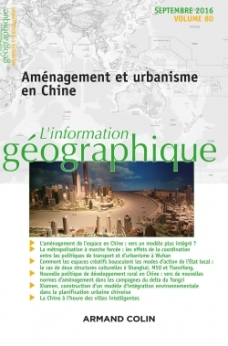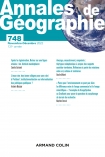
L'information géographique (3/2016)
Pour acheter ce numéro, contactez-nous
Recevez les numéros de l'année en cours et accédez à l'intégralité des articles en ligne.
Le développement des villes intelligentes en Chine continentale comme à Hong Kong est un phénomène récent qui s’inscrit dans un contexte de transition écologique et énergétique, mais également de financiarisation de la ville et de ses services. Dès lors, les politiques de villes intelligentes rendent compte des conditions de la production urbaine chinoise, caractérisées par un encadrement fort des pouvoirs centraux et locaux, ainsi que la mise en place de coalitions de croissance locales. Cette contribution se propose de montrer comment le numérique devient un référentiel important des politiques territoriales afin d’en interroger la réelle substance au-delà des mises en scène. Pour cela nous proposons de confronter ces politiques publiques aux conditions de réalisation des projets (urbains) intelligents en Chine continentale, comme à Hong Kong.
The development of smart cities in both mainland China and Hong Kong is a recent phenomenon that take place within a context of environmental and energy transitions and within a context of financiarisation of the city and its services. Therefore, smart cities policies reflect the conditions of the Chinese urban production, characterized by a strong leadership of both the central and local authorities, as well as the establishment of local growth coalitions. This contribution aims to show how digitalisation becomes an important reference frame for local policies in order to examine the real substance beyond staged. For this we propose to confront these public policies to smart (urban) project implementation conditions in mainland China and Hong Kong. Given the shortness of sustainability policies, urban smartness does or does not consist in adding a digital dimension to existing urban projects, desired as sustainable ?

